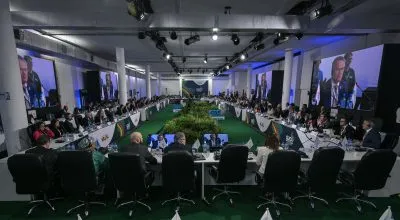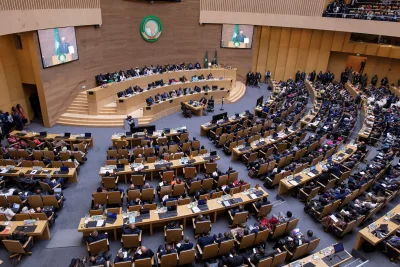Nigeria’s foreign investment and reserves front has been decidedly cold thus far this year. FX outflows have been marginally greater than inflows while there has been a dramatic drop in reserves. Nevertheless, as Michael Nwadike has discovered, many stakeholders are not unduly worried about the trend and some even see positive signs in it.
In the first quarter of the year Nigeria’s economic indicators were negative. Falls in foreign direct investment (FDI), foreign exchange reserves, equities and bond markets remained sources of worry.
The Nigerian Stock Exchange’s (NSE) maiden foreign investment report showed that of total foreign transactions worth N89.67bn ($557.4m) in January, total outflow was N50.14bn ($305m) as against inflow of $245.5m.
The figures represent a general decline from January 2013: foreign investment inflow was $254.6m and outflow $127.4m.
Also, data from the Central Bank of Nigeria (CBN) showed that gross external reserves, which closed last year at $42.85bn, had dropped to $38.1bn at 24th April this year. The reversal of capital flows is expected to persist with the run-up to 2015 elections.
The CBN explained at its last Monetary Policy Committee (MPC) meeting that the decrease in reserves was caused largely by a slowdown in portfolio and FDI flows, as it continued to defend the naira.
The Excess Crude Account (ECA) has also been declining, hitting $2.5bn in April from $11.5bn in December 2012.
Analysts say the decline in these fiscal buffers constitutes principal risk to exchange rate stability, especially with uncertainties around the oil price.
Equities market
After posting a record 47.2% growth in 2013, the equities market ended the first quarter with a decline. By December 2013, market capitalisation (which measures the value of equities in the market), had recovered and surpassed the pre-meltdown (2008) level of $80.11bn.
Given this impressive growth, investors had expected a positive start to 2014 but the reverse was the case. The ASI fell by 6.2%, declining from 41,329.19 to close at 38,748.01. Similarly, the market capitalisation of the exchange shed $4.48bn, falling from $81.14bn to $76.66bn.
The decline was the highest among the leading African equities markets. The only other market that closed the first quarter on negative note was Mauritius, which fell by a marginal 0.38%.
Optimism persists
Despite some obvious headwinds in the market at the beginning of the year, some analysts projected a bright outlook for the rest of 2014, adding that the headwinds could lead to positive development for the market.
Victor Ogiemwonyi of Partnership Investment Company Plc, says that investors should look forward to 2014 with high optimism despite the obvious risks.
“While the election in 2015 presents some risks, it cannot be worse than what we have had in the past. Election year also brings with it plenty of liquidity, which will end up in the market and should help push up demand for stocks,” he says.
He added that the winding down of quantitative easing by the US Federal Reserves had led to funds outflow from emerging markets as US economic indicators improved.
David Adonri, chief executive officer of Lambert Trust and Investment Company, sees a positive outlook for the year, considering ongoing reforms in the capital market and improved regulatory environment.
“Heightened political activities will increase macroeconomic liquidity, which would impact positively on the equities market. But activities in the fixed income market are expected to slow down since a decline in interest rate is imminent,” Adonri says.
Sewa Wusu, head of research at Sterling Capital, says the stock market would sustain its strong performance. He says the anticipated improvement in power generation would boost corporate performances by reducing cost, increasing industrial output and profit margins.
Want to continue reading? Subscribe today.
You've read all your free articles for this month! Subscribe now to enjoy full access to our content.
Digital Monthly
£8.00 / month
Receive full unlimited access to our articles, opinions, podcasts and more.
Digital Yearly
£70.00 / year
Our best value offer - save £26 and gain access to all of our digital content for an entire year!
 Sign in with Google
Sign in with Google 



